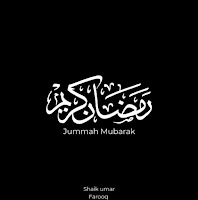Jummah Mubarak
"Jummah Mubarak" is an Arabic phrase used by Muslims to greet each other on Fridays, which is the holiest day of the week in Islam. It translates to "Blessed Friday" or "Happy Friday" in English. Muslims traditionally attend a congregational prayer called Jummah on Fridays, which consists of a sermon followed by a communal prayer. The greeting of "Jummah Mubarak" is used to acknowledge and celebrate the importance of this day in Islamic culture. It is also common to see "Jummah Mubarak" messages and images shared on social media and other platforms among Muslim communities."Jummah Mubarak" is a traditional Muslim greeting reserved for use on the day of Jummah, which is the holiest day of the week in Islam. It translates to "Blessed Friday" in English. This greeting is often exchanged between Muslims on Fridays as a way of recognizing the importance of the day and acknowledging the community's shared faith. It is also common for Muslims to share inspirational quotes and prayers on social media platforms on Fridays with the accompanying greeting of "Jummah Mubarak"."Jummah Mubarak" is a greeting used by Muslims on Fridays, which is considered the holy day of the week in Islam. It is a way to wish each other a blessed and happy Friday, and a reminder to attend the Friday prayer at the mosque. The greeting can be accompanied by other phrases such as "May Allah bless you" or "Peace be upon you." It is a common practice for Muslims to greet each other with "Jummah Mubarak" through text messages, social media, or in person.Jummah Mubarak is a traditional Muslim greeting and means "Blessed Friday". It is often used as a way for Muslims to greet each other on Fridays, which is considered the most important day of the week for Muslims. On Fridays, Muslims are encouraged to attend congregational prayers called Jummah prayers, where a sermon is given by the Imam.
In addition to attending prayers, Muslims often spend Fridays engaged in worship and good deeds, such as giving to charity, visiting the sick, or reading the Quran. Saying "Jummah Mubarak" is a way to celebrate this special day and to wish blessings upon others.
It is also common for Muslims to exchange greetings and well wishes with family and friends on Fridays, either in person or through social media and messaging apps.
I hope this answers your question. Let me know if you have any further questions.Friday,Jummah MubarakQuranJumu'ah Mubarak is a traditional Muslim greeting used on Fridays, which is the holiest day of the week in Islam and when special congregational prayers are offered. The phrase translates to "happy Friday" or "have a blessed Friday" and is used to wish others well on this important day. Muslims offer weekly prayers on Friday noon, which is considered a sacred day in their religion. The phrase "Jumma Mubarak" literally means "Happy Friday" or "Blessed Friday" in Arabic, where "Jumma" means "Friday" and "Mubarak" translates as "blessed". Muslims offer weekly prayers on Friday noon which is sacred to their religion and considered holy day in Islamic religion. The phrase is generally believed to be a friendly greeting on the holy day of Jummah, not something suggested or said by the Prophet Muhammad himself or written in Islamic law
Jumu'ah Mubarak is a traditional Muslim greeting used on Fridays, which is the holiest day of the week in Islam and when special congregational prayers are offered1. The phrase translates to "happy Friday" or "have a blessed Friday" and is used to wish others well on this important day. Muslims offer weekly prayers on Friday noon, which is considered a sacred day in their religion1. There are various quotes, duas, and wishes that can be used to expressJumu'ah Mubarak is a traditional Muslim greeting used on Fridays, which is the holiest day of the week in Islam and when special congregational prayers are offered. The phrase translates to "happy Friday" or "have a blessed Friday" and is used to wish others well on this important day. Muslims offer weekly prayers on Friday noon, which is considered a sacred day in their religion. The phrase "Jumma Mubarak" literally means "Happy Friday" or "Blessed Friday" in Arabic, where "Jumma" means "Friday" and "Mubarak" translates as "blessed"12. It is a friendly greeting on the holy day of Jummah and is not something suggested or said by the Prophet Muhammad himself or written in Islamic law2.Jumu'ah Mubarak is a traditional Muslim greeting used on Fridays, which is the holiest day of the week in Islam and when special congregational prayers are offered. The phrase translates to "happy Friday" or "have a blessed Friday" and is used to wish others well on this important day. Muslims offer weekly prayers on Friday noon, which is considered a sacred day in their religion. The phrase "Jumma Mubarak" literally means "Happy Friday" or "Blessed Friday" in Arabic, where "Jumma" means "Friday" and "Mubarak" translates as "blessed". Muslims offer weekly prayers on Friday noon which is sacred to their religion and considered holy day in Islamic religion. The phrase is generally believed to be a friendly greeting on the holy day of Jummah, not something suggested or said by the Prophet Muhammad himself or written in Islamic law



